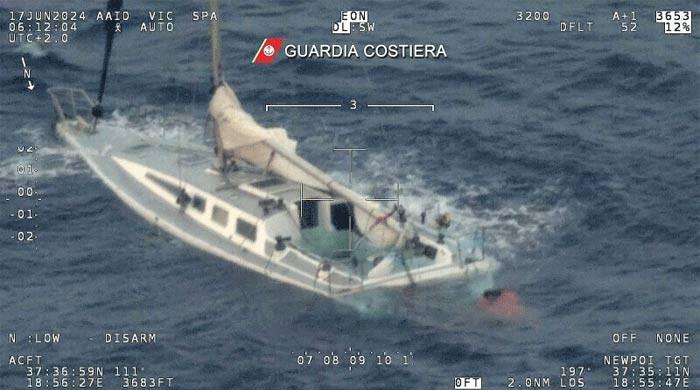- 51 migrants rescued near Lempedusa island in Mediterranean Sea.
- Most of shipwreck victims from Pakistan, Bangladesh, Syria, Egypt.
- Three people found dead near separate migrant shipwreck off Italy.
Incidents of boat capsising continue to claim lives as at least 11 people including Pakistani migrants were reportedly killed when a vessel sank near the coast of Italy.
According to the German sea rescue charity RESQSHIP, 51 people were rescued from a wooden boat about 90 kilometres south of the island of Lempedusa in the Mediterranean Sea on Monday.
On the lower deck of the vessel, 10 bodies were found trapped.
The captain of the rescue boat “Nadir,” Ingo Werth, said that “the (migrants’) boat was almost capsizing, and so it was a potential grave for rescuers.”
The passengers onboard reported to aid workers that they set sail from the Libyan port of Zuwarah two days ago and that most of the migrants belonged to Pakistan, Bangladesh, Syria, and Egypt.
Three people found dead near migrant shipwreck
Another migrant shipwreck was reported between Italy and Greece on Tuesday, in which 64 people were said to be missing while three dead bodies were recovered off Italy’s coast.
Up until now, 11 people have been rescued from the second boat.
As per the Italian coast guard, two patrol boats, one ship, and a plane had been deployed to search for the missing passengers, which include 26 unaccounted children.
No further information has been released about the three recovered bodies.
According to a joint statement from the UN refugee agency UNHCR, the International Organisation for Migration, and the UN children’s agency UNICEF, the migrants had set sail from Turkey, spent eight days at sea, and came from Iran, Syria, and Iraq.
The Doctors Without Borders (MSF) charity said some migrants also came from Afghanistan.
The two shipwrecks have confirmed the central Mediterranean’s reputation as one of the world’s most dangerous migration routes. According to U.N. data, more than 23,500 migrants have died or gone missing in its waters since 2014.

